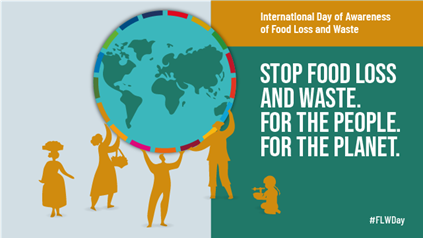The International Day of Awareness of Food Loss and Waste is an opportunity to call to action both the public (national or local authorities) and the private sector (businesses and individuals), to prioritise actions and move ahead with innovation to reduce food loss and waste towards restoring and building back better and resilient-ready, food systems.
Food loss and waste undermine the sustainability of our food systems. When food is lost or wasted, all the resources that were used to produce this food - including water, land, energy, labour and capital - go to waste. In addition, the disposal of food loss and waste in landfills, leads to greenhouse gas emissions, contributing to climate change. Food loss and waste can also negatively impact food security and food availability, and contribute to increasing the cost of food.
Our food systems cannot be resilient if they are not sustainable. Hence the need to focus on the adoption of integrated approaches designed to reduce food loss and waste. Actions are required globally and locally to maximise the use of the food we produce. The introduction of technologies, innovative solutions
How is FST contributing to the awareness of food loss and waste through research?
- Students enrolled in the MSc. Food and Agro-processing Technology programme (Department of Chemistry) are conducting research projects evaluating the conversion of agricultural waste into value added projects and shelf life extension. Examples of these projects include:
- Management of glycerol waste from biodiesel production (Denise Campbell; Supervisor: Dr Michael Coley).
- Effects of modified atmosphere packaging on microbiological, chemical and sensory qualities of ackee fruit arils (Blighia sapida Köenig) stored under refrigerated regimes (Kaytana Morgan; Supervisor: Prof Noureddine Benkeblia).
- Research is being conducted by graduate students in the area of Food Security: Examples of these projects:
- “Determinants of drought risks and adaptation response options in farming communities across Clarendon, Jamaica” (Dr. Sarah Buckland - Geography and Geography).
- Rapid propagation of Cassava by multiple shoot removal: Physiological factors and their interrelationships determining its efficiency” (Fradian Murray - Department of Life Sciences).
- “Sweet potato virus diversity in two Caribbean countries: Molecular characterization of select sweet potato viruses in Jamaica and Trinidad and Tobago” (Lloyd Johnson - Department of Life Sciences).
To learn more about programmes and research activities:

